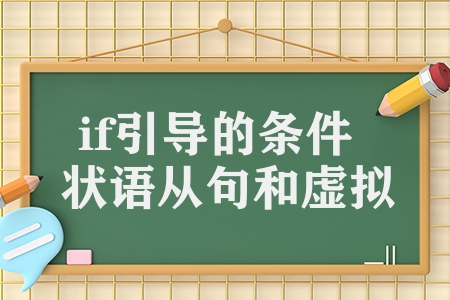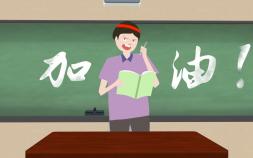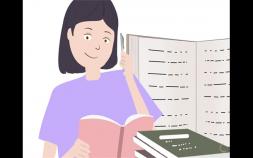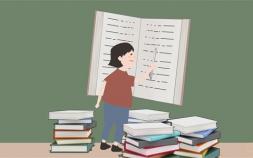if引导的条件状语从句和虚拟语气(if引导条件状语虚拟语气的时态)

虚拟语气可以在状语从句中表示让步、方式和条件的句中出现,但他们体现的方式有所不同。这里谈谈if引导的条件状语从句中的虚拟语气。
1.虚拟语气用在条件状语从句中表示与事实相反的假设。通常由连词if来引导。在表示对将来的虚拟时有下列形式。
主句用would/should/could/might加动词原形,从句部分用should或者是were构成。比如:
If you should need our help,you could tell us.如果你需要我们的帮助,请告诉我们。If it should happen,what would we do?如果发生的话,我们怎么办?
2.当虚拟条件句表示与现在事实相反时,它的形式是:主句用would/should/could/might+动词原形,从句部分用动词的过去式或were。比如:
If I were you, I’d finish it on time.如果我是你,我就按时完成。If I were a bird, I would fly away.如果我是只鸟,我就飞走了。
3.当虚拟语气表示对过去的假设时,句中的主句谓语用would/should/could/might+have+过去分词,从句部分用had+过去分词。比如:
I was so busy yesterday. If I had time, I would have called on you.我昨天太忙了。我要是有时间早就去看你了。
If we had got up earlier, we would have caught the train. 如果我们早点起床,我们就赶上火车了。
4.从句中的连词if可以省掉,但从句要部分倒装。前提条件是:从句中谓语动词有were、had、should。这些词可以提到从句最前面,也就是构成了虚拟条件句的另一个句型。这也是虚拟语气的考点之一。比如:
Were there no gravity, there would be no air around the earth.假如没有重力,地球周围就没有空气。
Were she in Beijing, she would help us.假如她在北京的话,她是会帮助我们的。
Had he time, he would help us to solve these problems.假如他有时间,他就会帮我们解决这些问题了。
Should they come to us, I should ask them some questions.假如他们真能来我们这里的话,我将问他们一些问题。
Had the checking up of the experimental data not taken so much time, we should have completed our work long ago.假如检验实验数据不花那么多时间,那末我们早就完成这项工作了。
Were it not for the leadership of the Party, we could not live a happy life.要不是党的领导,我们不可能过幸福生活。
相关问答
-
2024年内蒙古公务员考试资格复审公告

内蒙古自治区党政群机关2024年度考试录用公务员笔试成绩已发布,现将资格复审有关事宜公告如下。下面小编为大家整理了2024年内蒙古
阅读更多 -
神舟十八号乘组名单简介

4月24日上午,神舟十八号载人飞行任务新闻发布会在酒泉卫星发射中心举行,经任务总指挥部研究决定,瞄准4月25日20时59分发射神舟十八号
阅读更多 -
2024年海南中高考报名人数

4月24日,从2024年海南省中高考工作新闻通气会上获悉,今年海南中考报名人数135931人、高考报名人数74096人。下面小编为大家带来2024
阅读更多 -
上海普通话水平考试报名条件

上海普通话水平测试报名条件:本市户籍人员,持有本市有效期内居住证的外省市户籍人员。下面小编为大家带来上海普通话水平考试报名条
阅读更多 -
PETS全国英语等级考试考生须知

PETS全国英语等级考试共有五个级别,分别是一级B、一级、二级、三级、四级。下面是为大家整理的全国英语等级考试考生须知,喜欢可以
阅读更多 -
山东高考录取批次分数线划定及志愿设置公布

为做好2024年普通高等学校考试招生(夏季高考)(以下简称夏季高考)工作,根据教育部和我省有关文件要求,制定本办法。下面小编为大家带
阅读更多
最新问答
-

2024年内蒙古公务员考试资格复审公告
2024-04-26 -

神舟十八号乘组名单简介
2024-04-26 -

2024年海南中高考报名人数
2024-04-26 -

上海普通话水平考试报名条件
2024-04-26 -

PETS全国英语等级考试考生须知
2024-04-26 -
山东高考录取批次分数线划定及志愿设置公布
2024-04-26 -

神舟十八号载人飞船航天员简介
2024-04-26 -

五年级上册英语第一单元知识点
2024-04-26 -

小学五年级上册英语第三单元知识点
2024-04-26 -

五年级上册英语第四单元知识点总结
2024-04-26
